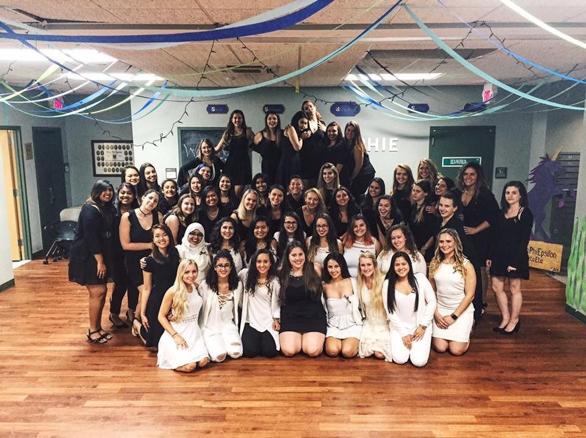Pictured left to right are the five founding sisters of the Sigma Colony of Kappa Phi Gamma: Keya Shah (President), Sneha Nambiar (Secretary), Bansari Patel (Vice President External) and Sarika Bhavsar (Vice President Internal).
On May 18 2016, five line sisters chartered a new sorority on campus at NJIT: the Sigma colony of Kappa Phi Gamma.
Commonly referred to by students as “KPhi”, the multicultural organization was established by 27 women at the University of Texas at Austin on November 8, 1998, making it the United States’ first South Asian interest-based sorority.
Kappa Phi Gamma is known nationally for their philanthropy—cancer awareness. Bansari Patel, Vice President of Kphi Sigma colony said, “Everyone is affected in some way by cancer. At some point in our lives, we meet or know of someone who is battling with cancer, whether it be a family member or a friend. Being in a sorority that advocates awareness and support shows that together, we can overcome this struggle that so many people have.”
Recently, the sisters held a Chipotle fundraiser, where proceeds will be donated to support an organization of their choice that supports cancer research and/or awareness.
However, the sorority’s dedication to community service and bettering the world they live in goes above and beyond fighting cancer. Keya Shah, the President of KPhi Sigma colony and a junior business information systems major said, “Our community service is not just limited to cancer awareness. We have also volunteered at soup kitchens, and made sandwiches to feed the homeless. As we continue to grow we definitely plan on pursuing other community service projects in the future.”
These selfless acts are only a small part of upholding the sorority’s eight principles: character, leadership, scholarship, service, sisterhood, culture, womanhood, and self. Each of these principles are equally important, and the sisters together focus on living these aspects of their lives to the fullest.
“One of my favorite principles is self because it focuses on improving yourself to be a better person not just in areas that you already excel at, but also acknowledging and working on the qualities that need more improvement. That’s something everyone should do,” added Shah.
“Womanhood is also an important quality. In many South Asian countries, the emphasis is placed on the oldest male son, and the achievements of the daughters are ignored. That shouldn’t be the case—women are just as strong, intellectual, and capable,” said Patel.
Amongst the eight principles the colony was chartered on, sisterhood played a fundamental role. In fact, without this principle, the Sigma colony may not be where it is today without the dedication of sisters at the national level. “Kappa Phi Gamma really is a national sisterhood—it’s a beautiful display of unity and the immense support system is crazy. When we were starting out, sisters came from universities from different states on regular weeknights for informational sessions, and they would travel overnight to go back to their university for classes the next day.”
The sisters are not just passionate about expanding the sorority, but also supporting each other outside of the Kappa Phi Gamma context. “Every sister I’ve met nationally is so genuine for taking their time to do this. I know I can rely on any of them if I needed anything. For example, if you landed in Texas and you reached out to some local sisters on Facebook asking for a place to stay, they wouldn’t turn you down. It’s like no sister gets left behind,” proudly added Patel.
Within the chapter, the support is just as strong. “Being a part of Kappa Phi Gamma is like a home away from home,” said Bansari.
“It’s like having another family. I see the girls every day and no matter how much we may disagree, we always love each other and are there for each other. If someone were to say something bad about one of my sisters I would always stand up for her. I’ve only had one sister at home, but now I have four!” proudly exclaims Keya.
Before chartering, the family of sisters began as an interest group, with the support of sisters nationwide, was founded in the fall of 2014. “Bansari, Sarika and I were originally part of the interest group in the Fall of 2014, my freshman year. We then recruited Mounika, and Sneha joined us later,” said the President.
For sororities looking to start a new colony, and eventually a chapter on campus, it is a long process. It involves community service, attending many meetings, communicating with nationals, and paperwork.
According to Shah, “one of the most important parts of the application was the Docier, which is like a personal resume—it asks many questions about who you are such as: what your GPA is, where you are from, and links to your social media accounts. Based on the national review of the application, the girls looking to join, and the university’s profile, they decide whether or not a new colony can succeed.”
Throughout the entire process, the girls had the support of not just other chapters, but also, their Greek Advisor at the time. “Allen White was really helpful…we’re sad that he left NJIT. Whenever we had questions, he would always help us and kept us informed. He was the national board’s direct contact and he helped us set everything up—including getting us involved on campus with events,” reminisced Shah.
Kappa Phi Gamma debuted at NJIT’s Multicultural Greek Showcase, where they strolled for the first time earlier this semester. They also cohosted various workshops with the Diversity Center and information tabling sessions in the Campus Center with other Greek Organizations. Recently they cohosted a “Real Men Don’t Rape” panel with Iota Nu Delta fraternity.
The sorority has big plans for the spring—CARE (Cancer Awareness: A Real Effort!) Week is the sorority’s main cancer fundraising awareness event, in which each day is dedicated to fundraising money to donate to cancer awareness and research groups.
Coming up on November 2nd in particular is Diwali Mela, a carnival celebrating the Indian New Year. This event is hosted by AIAS on campus, and each South Asian organization, including Kappa Phi Gamma, will have a table at the carnival.
Along with an on campus presence, philanthropy, and familial support, there are other important reasons why girls should consider Kappa Phi Gamma.
“Being in a South Asian national sorority is great networking—someone is bound to know someone. You won’t reach your full potential, there are so many opportunities you may not know about but being a part of the network can really help both professionally and socially,” says Patel.
Another great reason is scholarship. Each of the girls support each others’ academic goals. “Our academic chair looks over everyone’s GPA. It’s important to maintain your focus—you come to school to get a degree. Being in a sorority is an added bonus,” says President Shah.
Scholarship is a principle that is not just upheld within the sorority, but on campus, too. At the end of this upcoming spring semester, Kappa Phi Gamma plans on giving two scholarships to females who exhibit a strong academic record and a commitment to philanthropy and leadership on campus. One award is known as “Earn Your Stripes” and goes to any female in a Greek organization who demonstrates being a campus leader and having a strong academic record. The other award is known as the “Emerald Endowment Scholarship”, and is for any female student, regardless of whether or not they are involved with Greek life.
For some, though, joining a sorority is a decision that sometimes is known before seeing the perks in college. In fact, being in a sorority has always been an aspiration for President Keya Shah. “When I was a freshman in high school, I watched a show called ‘Greek’ and I really liked the show and the concept of being in a sorority. I told my parents since then I wanted to join a sorority. At the time I didn’t know that there was a South Asian sorority, and I told my parents if there wasn’t one, I want to start one. When I came to NJIT, other sororities were trying to rush me, but one day a girl approached me and asked me if I wanted to join an interest group for a South Asian sorority and I got so excited. It’s funny because freshman year I remember telling my parents I’d always wanted to start a sorority and here I am now!”




































